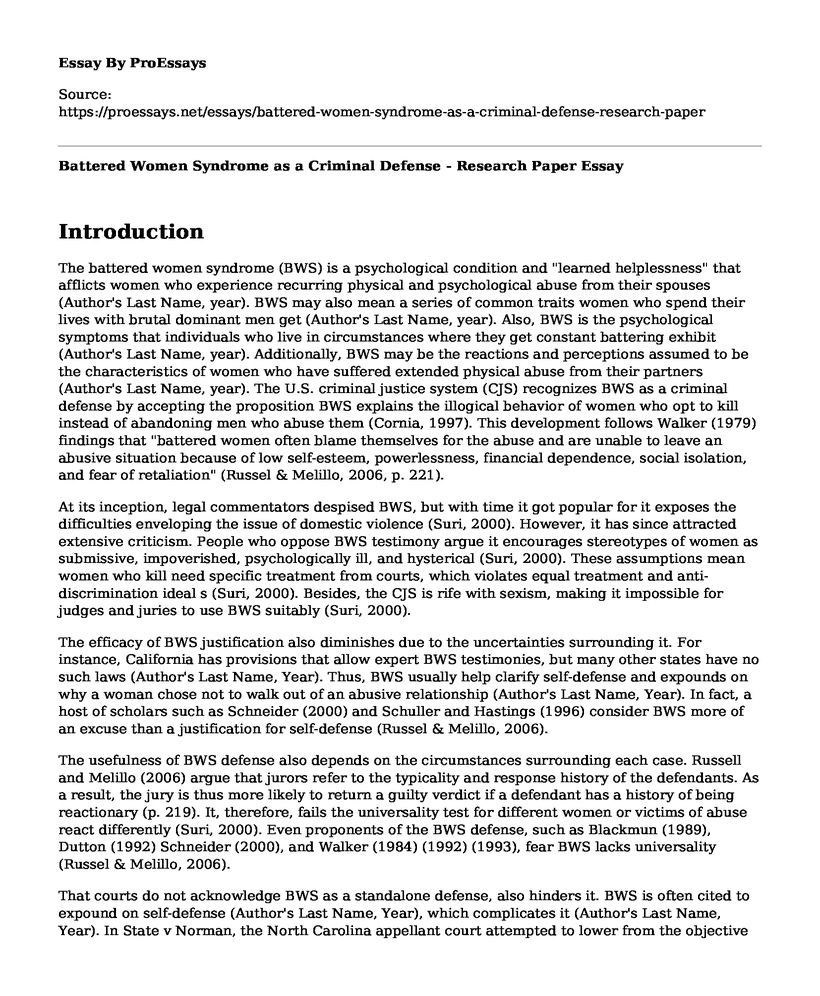Introduction
The battered women syndrome (BWS) is a psychological condition and "learned helplessness" that afflicts women who experience recurring physical and psychological abuse from their spouses (Author's Last Name, year). BWS may also mean a series of common traits women who spend their lives with brutal dominant men get (Author's Last Name, year). Also, BWS is the psychological symptoms that individuals who live in circumstances where they get constant battering exhibit (Author's Last Name, year). Additionally, BWS may be the reactions and perceptions assumed to be the characteristics of women who have suffered extended physical abuse from their partners (Author's Last Name, year). The U.S. criminal justice system (CJS) recognizes BWS as a criminal defense by accepting the proposition BWS explains the illogical behavior of women who opt to kill instead of abandoning men who abuse them (Cornia, 1997). This development follows Walker (1979) findings that "battered women often blame themselves for the abuse and are unable to leave an abusive situation because of low self-esteem, powerlessness, financial dependence, social isolation, and fear of retaliation" (Russel & Melillo, 2006, p. 221).
At its inception, legal commentators despised BWS, but with time it got popular for it exposes the difficulties enveloping the issue of domestic violence (Suri, 2000). However, it has since attracted extensive criticism. People who oppose BWS testimony argue it encourages stereotypes of women as submissive, impoverished, psychologically ill, and hysterical (Suri, 2000). These assumptions mean women who kill need specific treatment from courts, which violates equal treatment and anti-discrimination ideal s (Suri, 2000). Besides, the CJS is rife with sexism, making it impossible for judges and juries to use BWS suitably (Suri, 2000).
The efficacy of BWS justification also diminishes due to the uncertainties surrounding it. For instance, California has provisions that allow expert BWS testimonies, but many other states have no such laws (Author's Last Name, Year). Thus, BWS usually help clarify self-defense and expounds on why a woman chose not to walk out of an abusive relationship (Author's Last Name, Year). In fact, a host of scholars such as Schneider (2000) and Schuller and Hastings (1996) consider BWS more of an excuse than a justification for self-defense (Russel & Melillo, 2006).
The usefulness of BWS defense also depends on the circumstances surrounding each case. Russell and Melillo (2006) argue that jurors refer to the typicality and response history of the defendants. As a result, the jury is thus more likely to return a guilty verdict if a defendant has a history of being reactionary (p. 219). It, therefore, fails the universality test for different women or victims of abuse react differently (Suri, 2000). Even proponents of the BWS defense, such as Blackmun (1989), Dutton (1992) Schneider (2000), and Walker (1984) (1992) (1993), fear BWS lacks universality (Russel & Melillo, 2006).
That courts do not acknowledge BWS as a standalone defense, also hinders it. BWS is often cited to expound on self-defense (Author's Last Name, Year), which complicates it (Author's Last Name, Year). In State v Norman, the North Carolina appellant court attempted to lower from the objective approach it uses to define reasonableness in self-defense into a subjective one (Author's Last Name, Year). The state's Supreme court overruled this reasoning and stressed that the sense of imminent danger is paramount to the validity of self-defense and the test for what forms immediate danger is a subjective one (Author's Last Name, Year).
Conclusion
Defense attorneys should not use BWS as a criminal defense for it is not a standalone defense, which forces legal practitioners and scholars to consider it as an element of self-defense. It also deflates the seriousness of domestic violence as a social crisis. Claiming BWS as a defense also presumes women are helpless, illogical, and indecisive and, thus, the CJS should treat them in a special manner. This line of thinking negates the essence of gender equity as an ideal worth pursuing. More important, BWS defense faces a plethora of scholarly criticisms, indicating citing it presents the opposing side with sufficient firepower to impeach it. Thus, it is a dangerous strategy for the defendant to claim BWS. A defending side that cites BWS risks commencing a case at a disadvantaged position.
References
Author's Last Name. (Year). The Book (PROVIDE THE DETAILS)
Cornia, R. D. (1997). Current use of battered woman syndrome: Institutionalization of negative Stereotypes about women. UCLA Women's Law Journal, 8(1), 99-123. https://escholarship.org/uc/item/73t5x0m5
Russell, B. L., & Melillo, L. S. (2006). Attitudes toward battered women who kill: defendant typicality and judgments of culpability. Criminal Justice and Behavior, 33(2), 219-241. https://doi.org/10.1177/0093854805284412
Suri, S. K. (2000). A Matter of principle and consistency: Understanding the battered woman and cultural defenses. Michigan Journal of Gender and Law, 7(1), 107-139. https://repository.law.umich.edu/mjgl/vol7/iss1/3
Cite this page
Battered Women Syndrome as a Criminal Defense - Research Paper. (2022, Nov 29). Retrieved from https://proessays.net/essays/battered-women-syndrome-as-a-criminal-defense-research-paper
If you are the original author of this essay and no longer wish to have it published on the ProEssays website, please click below to request its removal:
- Argumentative Essay on Marijuana Legalization
- The Effectiveness of Evidence-Based Juvenile Justice Programs - Research Paper
- Essay Sample on Criminal Defense
- The 5th Amendment Privilege Against Self-Incrimination - Essay Sample
- Crime: Learned Behaviour: Sutherland's Differential Association Theory - Essay Sample
- Essay Example on Youth Arrests in America: 95% Non-Violent, But Records Remain
- Essay Example on a Look Into Surveillance: Ancient to Modern Monitoring Techniques







